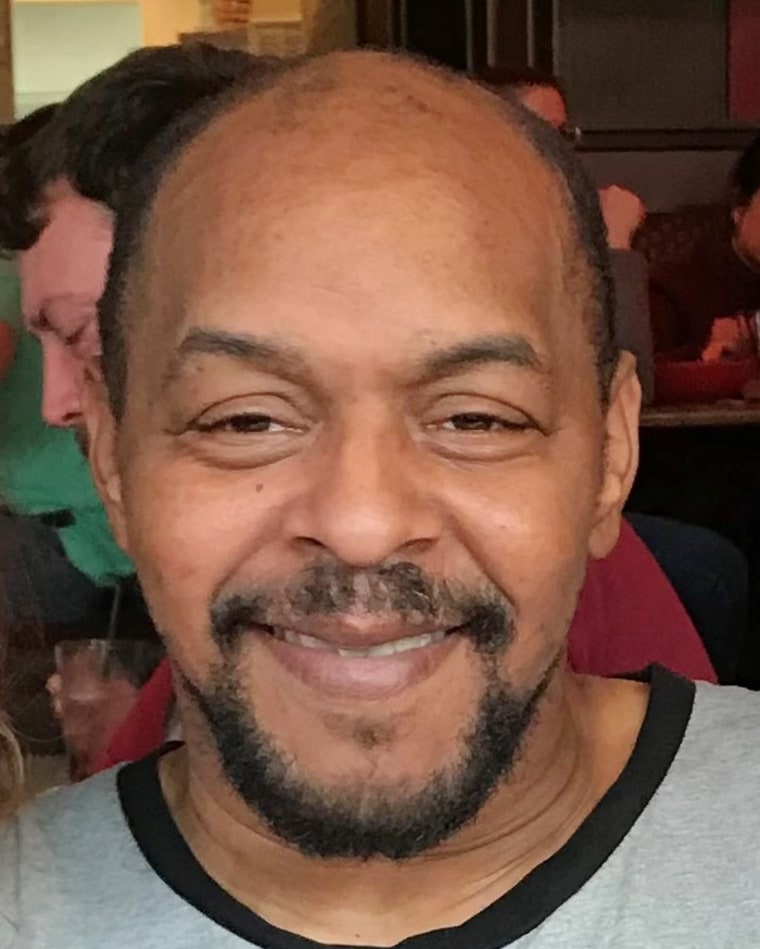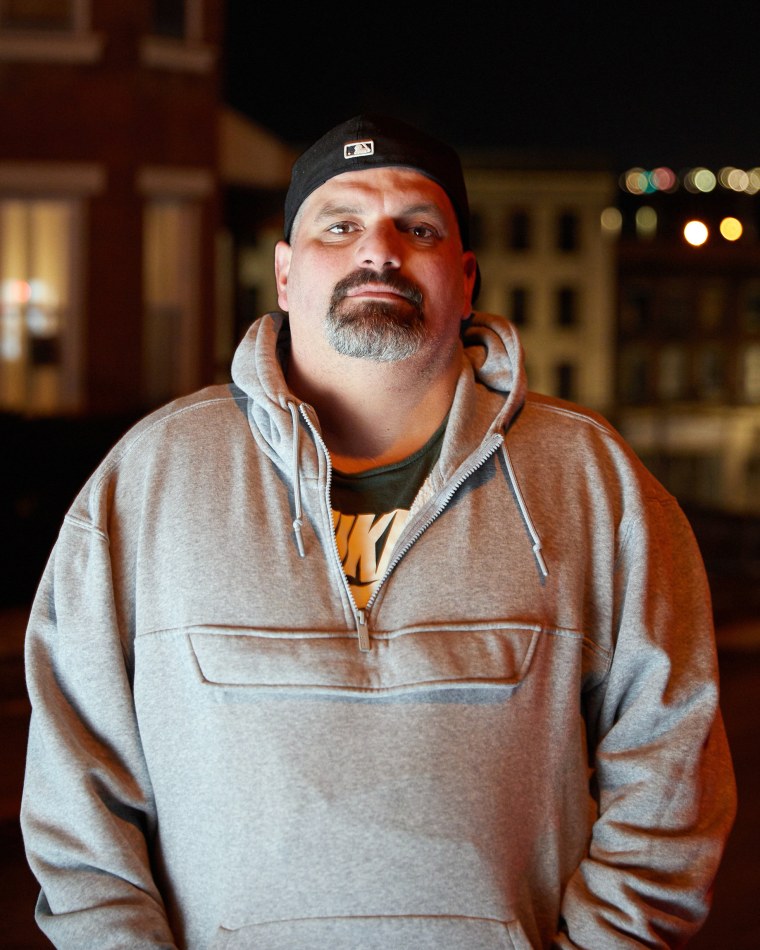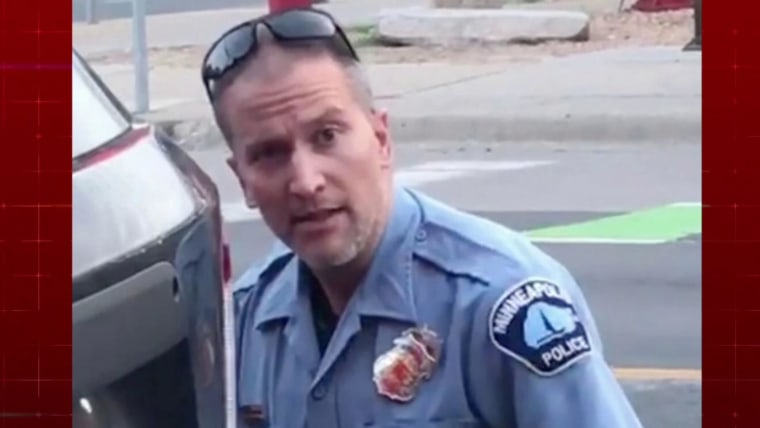'He choked me out': Others detail allegations of abuse by officer who knelt on George Floyd
Multiple people who had run-ins with Chauvin before the deadly encounter have accused him of using excessive force.
Multiple people who had run-ins with Chauvin before the deadly encounter have accused him of using excessive force.
In November 2013, Minneapolis police pulled over LaSean Braddock shortly after midnight as he drove home from a double shift as a mental health worker at Hennepin County Medical Center.
Braddock, 48, said he had grown somewhat accustomed to being stopped by police because his identity had been stolen and he was sometimes mistaken for the man who had been using his name. He carried paperwork with him from the Minnesota Bureau of Criminal Apprehension as proof, he said, so the stops were usually brief: He would show the paperwork to officers; they'd review it and let him go. But the officer at his driver's side window that day stuffed the documents in his pocket without looking at them, Braddock said.
When he hesitated to get out of the car, the officer aggressively hit the driver's side window with a flashlight, Braddock said. Two officers then tried to pull him from the car before he got out on his own.

"Then they tried to slam me on the ground, but I was about 240 pounds," Braddock said, adding that although he still was unsure why he was stopped, he complied to avoid injury. "Then they jumped on my head and my neck and my back. I was lying flat on the ground."
More than six years later, Braddock saw one of those officers again as he watched a harrowing video of George Floyd's final moments. Derek Chauvin, Braddock said, was one of the officers who had treated him roughly. A police report from that night confirms that Chauvin was one of the arresting officers.
Floyd, who was Black, died May 25 after Chauvin, who is white, pressed his knee against his neck for several minutes while he cried out for help in handcuffs and said he couldn't breathe. His death sparked months of racial justice protests in dozens of cities around the world.
Chauvin, who is charged with second-degree murder in Floyd's death, is set to stand trial Monday.
Braddock said he believes Floyd might still be alive if the complaint he filed alleging excessive force by Chauvin the day after their encounter had been taken seriously and not dismissed.
"It's unfortunate that they didn't do anything to Derek Chauvin," Braddock said in a recent interview. "If they had done something about it, it might not have went that far."
Multiple people who had run-ins with Chauvin before the deadly encounter have accused him in interviews with news outlets and official complaints of using excessive force.
Chauvin, who was a 19-year veteran of the department before he was fired, was named in more than a dozen complaints that resulted in no disciplinary action and one that led to a "letter of reprimand."
The Minneapolis Police Department declined to comment about past complaints against Chauvin.
The Minnesota Attorney General's Office, which is prosecuting Chauvin's case, sought to introduce several arrests involving Chauvin dating as far back as 2014, alleging that they showed a history of excessive force.
Jurors may hear about one of those cases, the arrest of Zoya Code in 2017.
'Don't kill me'
According to court documents, Chauvin went to Code's home on June 25, 2017, on a report of a domestic dispute. A relative had accused Code, 38, of trying to choke her with an extension cord, but Code denied having done so. Code, who declined a request for an interview, told The Marshall Project, a nonprofit news organization that covers the criminal justice system, that the relative was swinging the cord around and that she had grabbed hold of it. Code said she had left the house to cool off after the dispute and that when she returned, she encountered Chauvin and another officer.
As Code walked by, Chauvin grabbed one of her arms and told her she was under arrest, prosecutors said in court documents. When she pulled away, Chauvin pulled her to the ground in the prone position and knelt on her, they said. After she was handcuffed, she refused to stand, so Chauvin carried her out of the house in a prone position and set her face down on the sidewalk.
Code told The Marshall Project that she began pleading: "Don't kill me."
According to the prosecutors' account, based on the police report and body camera video, at that point, Chauvin told his partner to restrain Code's ankles, "even though she was not providing any physical resistance."
Code told The Marshall Project that as he tied her, she told the officer: "You're learning from an animal. That man — that's evilness right there."
Code was charged with misdemeanor domestic assault and disorderly conduct. The charges were dismissed March 12, 2018.
Code is listed as a prospective witness for the state in Chauvin's trial. Prosecutors will juxtapose Code's treatment with Chauvin's actions in another case to demonstrate that Chauvin knew how to use reasonable force to restrain a person.
In that incident, Chauvin rendered aid to a suicidal, intoxicated and mentally disturbed man. "Defendant observed other officers fight with and tase the male," prosecutors wrote in a court filing. "Defendant then observed other officers place the male in a side-recovery position, consistent with training."
Chauvin rode to the hospital with the man, according to prosecutors. He and the other officers were commended by the police department for their efforts.

'He choked me out on the ground'
Other people who encountered Chauvin said his actions were much less measured.
Julian Hernandez, a carpenter, said he was on a road trip to Minneapolis in February 2015, with 20 or so of his co-workers to see a band at the El Nuevo Rodeo nightclub, where Chauvin worked as an off-duty security officer for almost 17 years. Hernandez said that he had been drinking and went to the bar to try to buy cigarettes but that they were too expensive. Hernandez said that as he walked away from the bar, he heard someone say, "It's time to go." He turned around and encountered Chauvin, who he said forced him to an exit.
"The whole club was still going," said Hernandez, 38. "And he picked me out of everybody and told me that I had to go because they were going to close."
He said he tried to tell Chauvin that he needed to retrieve his jacket from the coat check and even showed him his ticket.
"I'm like, 'Dude, let me go get my jacket at least. It's wintertime,'" Hernandez said. "And he wouldn't let me."
Once they got outside, "things got physical," Hernandez said.
"He tried to grab me from my neck, and, of course, I reacted," Hernandez said. "And then, after that, he choked me out on the ground."
Chauvin restrained Hernandez "by applying pressure to" his lingual artery below his chin and "pressing him" against a wall, according to prosecutors. He then pulled Hernandez to the ground, placed him in a prone position, handcuffed him and waited for other officers to arrive, they said.
He said he distinctly recalled Chauvin's choking him. Hernandez said that at the time, he had been clean for about six years after having served time in prison in California in his early 20s for selling drugs.
Hernandez said he filed a formal complaint the day after the incident, which was later dismissed, and that he tried to sue the police department but that no lawyer would take his case. He wasn't trying to sue for financial reasons, he said. "I just wanted them to know what kind of cop they have on their squad," he said.
Hernandez was charged with misdemeanor disorderly conduct. He pleaded guilty a couple of months later and, after he stayed out of trouble for a year, the court vacated the plea and dismissed the case, records show. Hernandez's case was among those prosecutors sought to submit as evidence, but a judge denied the request.
"What he did to me was nothing compared to what he did to that poor Black dude," Hernandez said, referring to Floyd. "You can't take the law in your own hands."
In a court filing, Chauvin's attorney, Eric Nelson, said he acted appropriately. The filing says the encounter with Hernandez involved Chauvin "at bar close after Valentine's Day, in the dark, early morning hours dealing with a resistant, aggressive arrestee by himself."
"Chauvin ascertained and reported that the arrestee was actively resisting," the filing states. "Under the Minneapolis Police Department Use of Force policy in effect at the time, a neck restraint could 'be used against a subject who is actively resisting.'"
Nelson didn't return a request for comment about the allegations.
Hernandez said he believes that if Chauvin's superiors had "looked more into" complaints about "his aggressiveness" and reprimanded him, "he would still be a cop and George Floyd would be alive."
Braddock agreed.
Braddock, a former St. Paul resident who now lives in Chicago, said that the morning he was arrested, he asked Chauvin and the other officer why they had stopped him but that they never gave him an answer.
He was booked in the Hennepin County Jail on charges of failure to comply with police orders and obstruction of the legal process, according to a public information report, which said "a routine license plate check" of his vehicle showed the owner as having a felony warrant.
The case was dismissed in January 2014. Braddock's attorney at the time, Jordan Deckenbach, said prosecutors tossed the case after the City Attorney's Office reviewed the video from the squad car. The City Attorney's Office said it no longer had a record of why the case was dismissed.
The formal complaint Braddock filed against Chauvin the day after his detainment was also dismissed, he and his attorney said.
"The fact that Mr. Braddock's complaint was dismissed without him being contacted and interviewed is evidence that the complaint was not taken seriously," Deckenbach said. "If Officer Chauvin had been disciplined for physically abusing Mr. Braddock, to include kneeling on Mr. Braddock's neck, perhaps Officer Chauvin would have taken a different approach with George Floyd, resulting in George Floyd still being alive today."

No comments:
Post a Comment